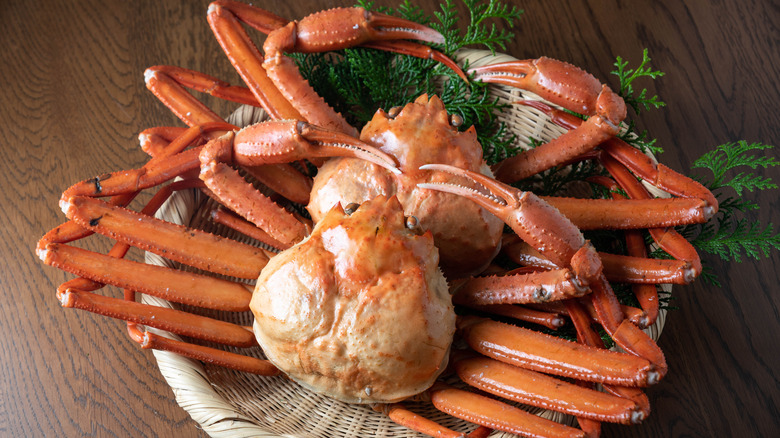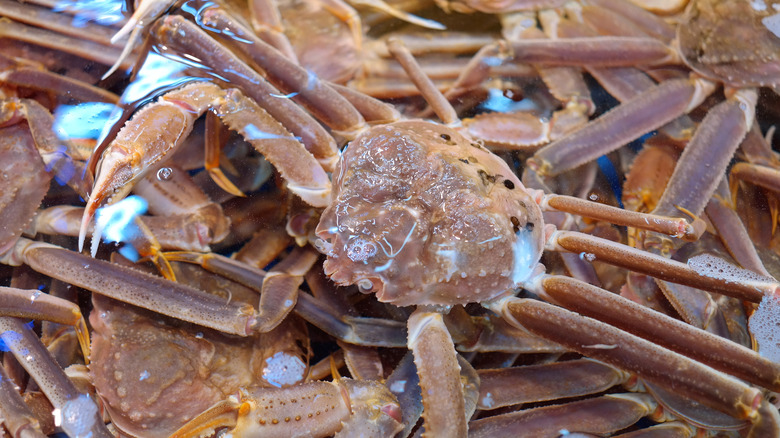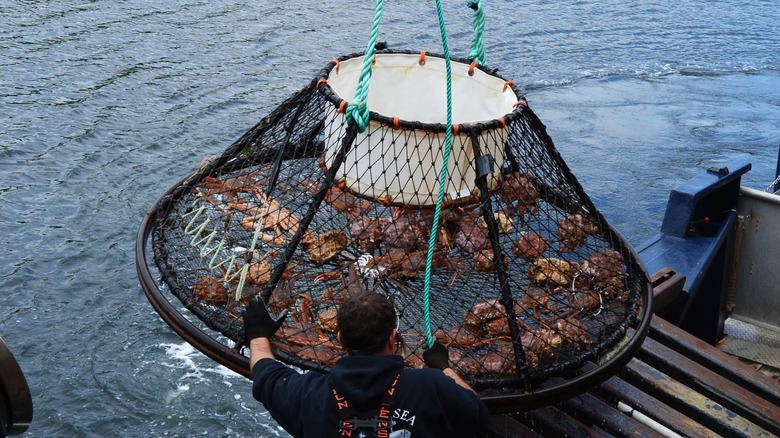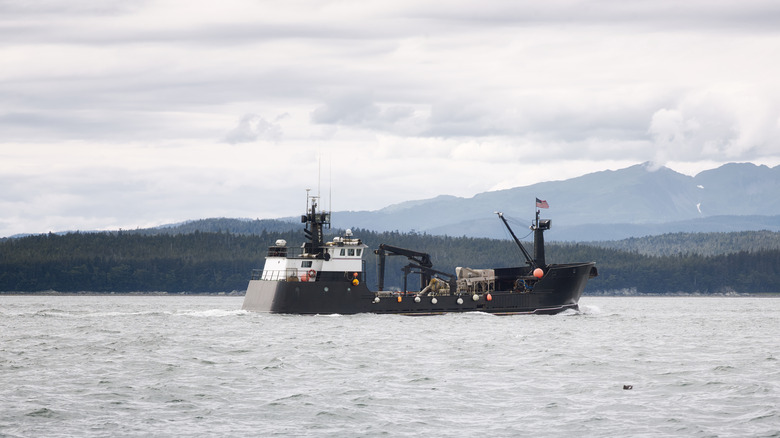Alaska Has Canceled Snow Crab Season Over A Troubling Trend
If anyone had any doubt about the destructive impact of climate change on our food supply chain, they need only look at the disruptions we've seen so far this year. Thousands of heads of cattle were killed after higher-than-expected temperatures were seen in Kansas (via CNN). As much as half of Northern Italy's agricultural output was compromised as drought dried out rivers and lakes across the country, per Reuters.
Now it's Alaska's turn, as state officials announced their decision to do away with winter crab harvests this year. The decision covers different species of crab found in Alaska's waters, including the Bering Sea snow crab, the opilio snow crab, the red king crab, and the blue king crab, per Eyewitness News. The cancellation is historic for many reasons, because according to the Alaska Bering Sea Crabbers, "Bristol Bay red king crab will be closed for the second year in a row, and Bering Sea snow crab will close for the first time in the history of this fishery."
Alaka's popular crab species have been struggling
The cancellation of crabbing season is especially devastating for the Baring Sea snow crabs because the species appeared to be bouncing back after decades of overfishing. The Washington Post said that "a record number" of young crabs were seen on the ocean floor between 2018 and 2019; unfortunately that now appears to have reversed itself, and state officials say 90% of snow crabs – or about a billion crabs – are unaccounted for, per CBS News. As a result, The Washington Post says that the federal government now considers the snow crab to be overfished and, per the Alaska Department of Fish and Game (ADFG), "Management of Bering Sea snow crab must now focus on conservation and rebuilding given the condition of the stock. Efforts to advance our science and understanding of crab population dynamics are underway."
The situation involving the winter red king crab appears to be slightly less dire, although it is serious, too. Fishing had already been canceled once before, in 2021, with ADFG officials saying the stocks were "below the regulatory threshold for opening a fishery," per Seafood Source. The closure also caused waves at the time, because it was the first time since 1994 that the fishing season was canceled because stocks had declined to such an extent that commercial fishing would not be viable.
Climate change appears to be a factor
Scientists are working to find out what happened, particularly where the Bering sea snow crab is concerned. But for now, the most obvious suspect is climate change. Ben Daly, who works with the Alaska Department of Fish and Game, said that while disease was a possibility, climate change was a more obvious reason. "Environmental conditions are changing rapidly. We've seen warm conditions in the Bering Sea the last couple of years, and we're seeing a response in a cold adapted species, so it's pretty obvious this is connected. It is a canary in a coal mine for other species that need cold water," Daly said, per CBS News. The Washington Post says warming waters have already seen Alaska pollock and Pacific halibut moving away from the Bering Sea coast and further north in search of colder weather.
The shutdown is expected to cause Alaska's crabbing industry $500 million, per CBS Austin. It has also triggered warnings from Jamie Goen, Executive Director of the Alaska Bering Sea Crabbers, who said via Facebook, "These are truly unprecedented and troubling times for Alaska's iconic crab fisheries and for the hard-working fishermen and communities that depend on them ... Second and third generation crab-fishing families will go out of business due to the lack of meaningful protections by decision-makers to help crab stocks recover."
Crabbers see another potential reason for the crab shortage
Climate change may not be the only culprit in the disappearance of Alaska's crab stocks. Eyewitness News says crabbers have also been asking the North Pacific Fishery Management Council to increase efforts to cut back on "crab bycatch" – that is, crabs accidentally caught by fishing trawlers that use big nets at the bottom of the sea. While National Fisherman says all of Bering Sea boat fishermen need observers so fishery officials can keep track of what is kept and what eventually gets sent back into the sea, crabbers say they are worried about what happens underwater. It has cited studies that show that many of the crabs that get caught up in fishing gear "die after contact." It adds, "Given this number compared to what is observed as bycatch, the potential for unobserved mortality of crab could be millions of additional pounds of dead crab bycatch."
No crabs coming from Alaska will translate into even tighter supplies of this popular seafood. There has already been less crab to go around, thanks in part to such factors as a tight labor market in Maryland, as well as a boycott on Russian king crab supplies because of Moscow's aggression in Ukraine, per Seafood Source. Given that there is no easy solution to either of the two problems, it appears as though many crab lovers may have to do without the toothsome crustacean for a while.



